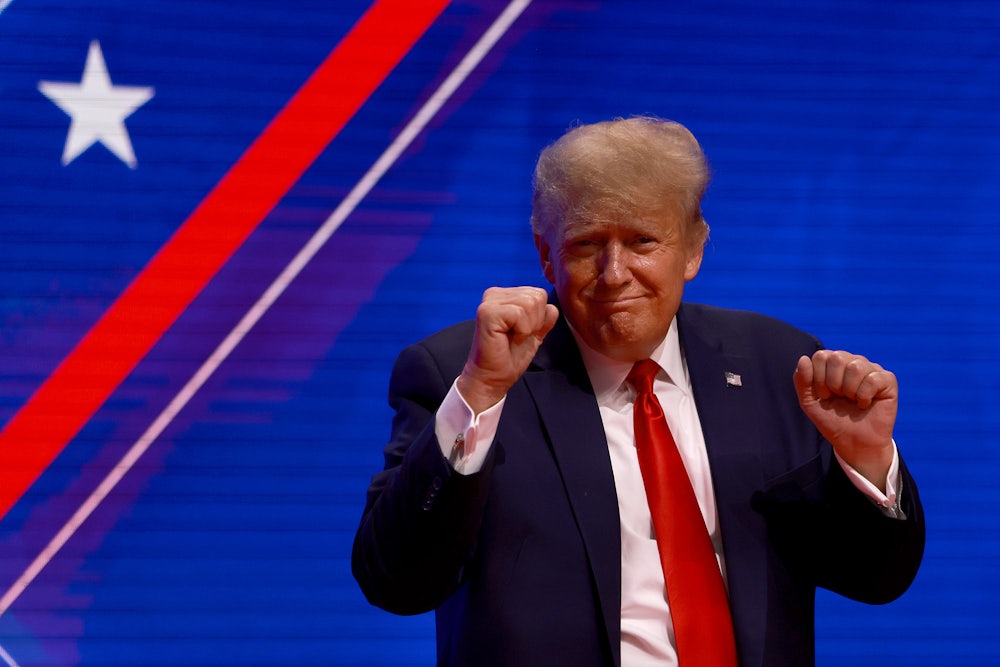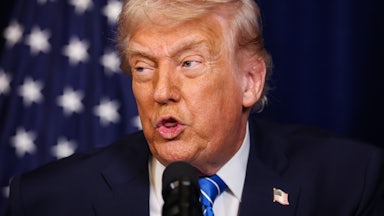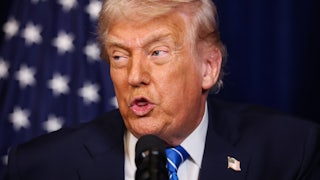Donald Trump did an interesting thing over the weekend. The man who called Vladimir Putin’s invasion of Ukraine an act of “genius” when it was launched was appearing before major GOP donors in New Orleans when he suddenly started singing a very different tune, musing that the United States put Chinese flags on American F-22s and then “bomb the shit out of Russia” in an attempt to pit China and Russia against each other.
It was a stunning—and telling—flip-flop. Usually since he came on the national scene, Trump has said whatever he wants to say, and the GOP follows along. It’s happened time and again with Trump’s Republican Party. He stakes out the position and, no matter how much of a reversal it is from wherever the GOP has been before, the party follows.
But this time is different. This time, Trump is the one who changed his tune. And it’s pretty clear why. After hesitating in the early days of the invasion, unsure whether to follow Trump down the path of Putin worship, most voices in the Republican Party have shifted toward the more traditional hawkish-neoconservative foreign policy tropes that once ruled the GOP.
Trump’s flip-flop shows that he got the message that, at this moment, Putin-coddling isn’t acceptable. Even Mike Pence took a shot at Trump recently, saying, “There is no room in this party for apologists for Putin.” The question is whether there’s any chance that Putin represents some kind of red line such that some, a few, a couple Republicans may split with Trump.
“One interesting thing that happened in the last week is that actually Republicans did change course,” said Dan Baer, the acting director of the Europe Program at the Carnegie Endowment for Peace and a former ambassador to the Organization for Security and Cooperation in Europe. Baer pointed to the Republican response to the State of the Union address by Iowa Governor Kim Reynolds earlier this month. “I mean, a week ago, the leader of the Republican Party was basically saying, ‘Putin’s a hero,’ and in the Republican response, Kim Reynolds, as boring as she was, was wearing a Ukrainian flag pin.”
Trump has followed the pack, issuing statements complaining about the lack of credit he’s gotten for arming Ukraine and, more broadly, that under his watch Russia never invaded anyone else (this argument has gotten a bit more traction in GOP circles but dramatically simplifies the dynamics between Russia and the U.S.).
“The Fake News Media refuses to report that I was the one who very early and strongly gave the anti-tank busters (Javelins) to Ukraine, while Obama-Biden was giving blankets, to great and open complaints,” Trump said in a statement on Tuesday.
Trump oftentimes says completely contradictory things depending on the crowd he’s speaking to, but his comments in New Orleans were significant. He was speaking in front of donors. What’s said in front of top donors can dictate the livelihood of a candidate or a campaign, and Trump clearly knew that.
Many Republicans now bristle when Trump’s or Tucker Carlson’s praise for Putin is connected to the GOP at large.
“There was a really type of lame attempt in the early days to paint the entire Republican Party with what Tucker Carlson and President Trump were saying,” said the Heritage Foundation’s Steve Groves, a chief of staff to then–United Nations Ambassador Nikki Haley during the Trump administration.
Of all the Republican rising stars, party leaders, and conservative elders, Trump has been the most positive about whatever Putin does. But the Ukraine crisis has shown just how far apart Trump is from the rest of the party. Senate Majority Leader Mitch McConnell (who has feuded with Trump for years) has issued press releases calling Putin a “thug” and said, “There’s broad support for the president in what he’s doing now. Our biggest complaint is, What took him so long?” Similarly, after refraining from weighing in at all, Florida Governor Ron DeSantis, possibly Trump’s most serious opponent in a possible 2024 Republican presidential primary, called Putin an “authoritarian gas station attendant with some legacy nuclear weapons,” while also calling the Biden administration’s response weak.
DeSantis, at times, opts to compete with Trump for support from the Trumpian wing of the Republican Party, but on Ukraine he clearly feels no need to match Trump’s enthusiasm for Putin or offer any kind of soft explanation for Russia’s invasion. It’s become increasingly clear Republicans don’t have to follow Trump’s every move to be successful within the party, whether it’s on foreign policy or elections. Glenn Youngkin won his upset victory to become governor of Virginia by keeping a healthy distance from Trump and opting against running as Virginia’s version of Trump (despite the most sincere efforts by Democratic nominee Terry McAuliffe).
It’s entirely possible that Trump’s iron grip on the party will further unravel in public view in the next few months as he tries to stop Congresswoman Nancy Mace, a Republican, from winning his party’s nomination in her South Carolina district. Mace at times has defied Trump, and now the former president wants to show that doing so has repercussions. Similarly, in Wyoming, Trump has made removing Congresswoman Liz Cheney from office a top priority this cycle. He’s actively backing primary challenger Harriett Hageman. But Cheney has substantially outraised Hageman, a sign that Cheney is not being suffocated out of Republican politics entirely.
On Ukraine, Cheney has found herself in line with much of the Republican Party (including some lawmakers who would rather see her lose reelection) and against Trump’s past boosting of Putin. On Tuesday, Cheney praised the Biden administration’s ban on Russian oil and pivoted to expanding domestic production of oil rather than talking with Venezuela and Iran to take Russia’s place as an oil importer.
The entire episode has allowed Cheney to go on offense among some of Trump’s most ardent supporters who have refused to criticize Russia. Cheney has been attacking those Russian sympathizers as the “Putin wing of the GOP.”
The neoconservative turned strong anti-Trumpist Max Boot penned an op-ed in The Washington Post on Tuesday wondering if Ukraine is really the end of the GOP’s “love affair” with Trump. There have been signs of fraying between Trump, other party leaders, and rank-and-file voters through Ukraine and elections this cycle.
“In short, for most Republicans, partisanship trumps—pardon the word—any principle, even devotion to our democracy,” wrote Boot. “Because most Republicans hate Democrats more than they hate Russia, Trump likely doesn’t have to worry that his Putinphilia will cost him a significant amount of support with his base no matter how many civilians Putin slaughters.”
Probably. But that depends on what happens with the war, and how many Ukrainians Putin kills. That may matter even to rank-and-file Republicans.






